Cross-posted at Fem2pt0.
Smashing box office records, audiences have been swept up in The Avengers hullabaloo. Interesting and compelling, the epic superhero film based on the Marvel comics unites Black Widow, Captain America, Iron Man, Hawkeye, the Hulk and Thor “to form a team that must stop Thor’s brother Loki from enslaving the human race.” It was good. Really good. It contained complex characters and funny, clever dialogue. In a genre that exhibits strong female characters yet often objectifies women’s bodies or reduces them to ancillary love interests…how was The Avengers’ portrayal of women?
With Joss Whedon,
a proud feminist and Equality Now supporter, at the helm directing and screenwriting, I eagerly hoped for a feminist film. I absolutely adore
Firefly, only watched a handful of
Buffy episodes (I know, I know…I need to watch more), and I couldn’t stand
Dollhouse (don’t even get me started on the predication of rape, objectification and misogyny…but I digress). Forever inspired by
his radical feminist mother and his love for X-Men character Kitty Pryde, Whedon shows an adept talent for creating and writing strong female characters.
The lone female Avenger is Natasha Romanoff, aka Black Widow (Scarlett Johansson), a “highly trained spy,” assassin and martial arts master. Haunted by a dark past, she’s a fearless warrior possessing a razor sharp mind and an impressive knack for interrogation. In one of the best scenes, she goes head to head with the film’s villainous nemesis Loki (and Thor’s brother) in a labyrinthine mind game. While I’m not thrilled that Black Widow uses “feminine wiles” as a method of manipulation, her opponents anticipate vulnerability in her because of her gender. Natasha deftly uses and exploits their stereotypical gender biases to her advantage.
Black Widow could have easily become a one dimensional character. Yet she embodies strength and depth. She’s decisive and forever in control of her emotions. Although I don’t like the implication that being emotional equates weakness. She’s not technically a superhero (nor is her partner archer Hawkeye) as she doesn’t have special powers. Yet she arguably had the best fighting sequences with her nimble and dexterous prowess. There’s one where she’s tied to a chair and kicks ass…it’s seriously amazing! Johansson talked about how she would be delighted to do a Black Widow film in the realm and style of
The Bourne Series. That sounds freaking awesome.
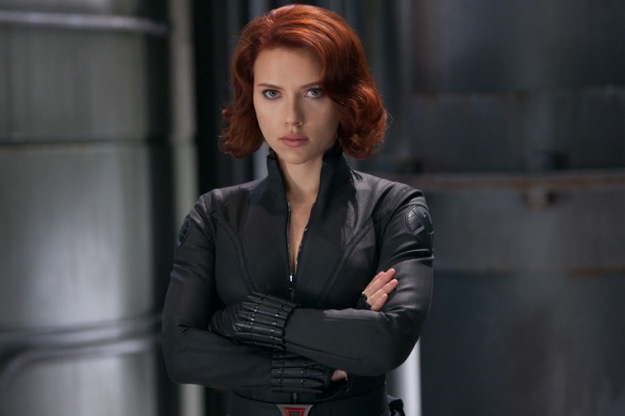 |
| Black Widow / Natasha Romanoff |
In most films and TV series, the media objectifies and commodifies women’s bodies for the male gaze, reducing a woman to her sexuality. While she dons tight costumes, that doesn’t happen here. She’s not merely a sex object. Black Widow is an integral part of the team. She’s the one who thinks they should all work together when petty arguments and inflated egos threaten to divide them. SPOILER!!! -> Natasha ultimately ends the climactic epic battle as she’s the only one who realizes they need to close the portal in order to halt the influx of the alien army. <- END SPOILER Black Widow plays with gender stereotypes but doesn’t wield her sexuality as a weapon. She uses her ridiculously impressive martial arts ass-kicking skills for that.
Aside from Black Widow, The Avengers film depicts S.H.I.E.L.D. Agent Maria Hill (Cobie Smulders, my favorite actor on HIMYM) and two brief scenes with Pepper Potts (Gwyneth Paltrow). Maria is one of S.H.I.E.L.D. Director Nick Fury (Samuel L. Jackson)’s Chief Lieutenants. She’s calm, collected and authoritative, even in dangerous situations. We see Maria run the deck of the S.H.I.E.L.D. Helicarrier. But she doesn’t approve of controlling people as we see when she criticizes Fury for manipulating The Avengers’ emotions to finagle a specific response. Pepper is the CEO of Stark Industries (Iron Man/Tony Stark’s company), as well as his girlfriend. She’s intelligent, precise, organized and charming.
When asked about Whedon’s strong female characters, Johansson called him “
gender blind:”
“He wants his female characters to be dynamic and competitive and assured and confident. And it has nothing to do with anything but the fact that he just celebrates those kinds of strong female characters.”
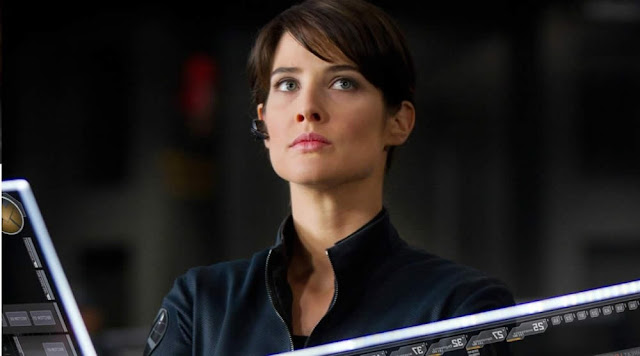 |
| S.H.I.E.L.D. Agent Maria Hill (Cobie Smulders) |
AlterNet’s Julianne Escobedo Shepherd thinks The Avengers possesses a “stark feminist perspective” as it differs from so many other superhero films. Even in movies with multiple female characters like X-Men, the women often orbit the male characters. Not so in The Avengers. Escobedo Shepherd goes further asserting Johansson portrays Black Widow’s “talent for manipulation as a boon for the art of spying, rather than any kind of femme fatale cliché.”
Despite three strong female characters and Black Widow’s awesomeness, I didn’t find the movie overtly feminist. I can’t help but wonder if people are looking to find feminism where not a whole lot actually exists because of Whedon’s reputation. The Avengers contains some gender problems.
Loki hurls a misogynistic insult at Black Widow, calling her a “
mewling quim.” Translation, a “
whining cunt.” Lovely. He reduces her to her vagina. Now, not everyone’s going to get the inference right away. I know I didn’t. Although something about the condescending tone made me suspect a gendered insult. Whedon says he often “abuses” language, depicting
different vernaculars, including Shakespearan dialogue, to reveal character traits. It’s interesting that instead of writing an overt insult, Whedon subversively portrayed Loki’s sexism.
Some people apparently accused Whedon of “
not being macho enough” to direct the superhero bonanza. So let me get this straight. If a guy is a proud feminist and writes strong female characters, that makes him unmanly to direct an action movie? And what does that say about women…that female directors possess too much estrogen to direct? Ugh.
Many critics and bloggers have focused on the Hulk, thanks in large part to Mark Ruffalo’s fantastic talent and the hilarious snarky dialogue, thanks to Robert Downey Jr.’s quick wit as Iron Man. Interestingly, of the 6 Avengers,
Black Widow gets the 3rd most screen time. Yet she still remains the only female Avenger in the film. And that’s a problem.
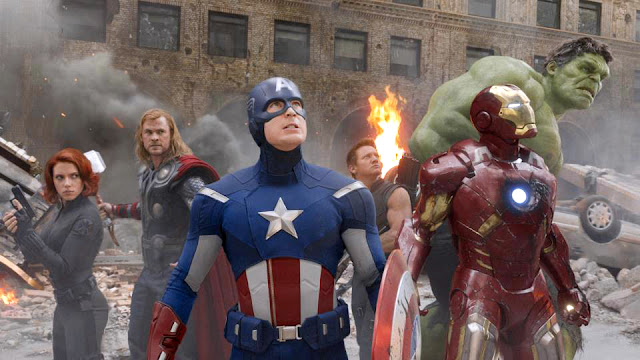 |
| (L-R): Black Widow (Scarlett Johansson), Thor (Chris Hemsworth), Captain America (Chirs Evans), Hawkeye (Jeremy Renner), Hulk (Mark Ruffalo), Iron Man (Robert Downey Jr.) – The Avengers…and Black Widow as the one female |
In the comics, The Avengers had a rotating line-up of superheroes. Couldn’t the movie portray an additional female Avenger, like Wasp or Scarlet Witch or She-Hulk? Maybe they didn’t want two green Hulks. Fair enough. Although She-Hulk, a brilliant attorney, is pretty badass. Whedon even said that when they weren’t sure if they could accommodate Scarlett Johansson’s tight schedule, an early script contained the female superhero (and founding Avenger) Wasp. He “
fell in love with the character.”
So here’s my question: why did they have to scrap the role of Wasp the minute they secured Johansson’s Black Widow? Why not have 2 female superheroes in one film?? Sadly, the movie suffers from the
Smurfette Principle.
Coined by feminist writer Katha Pollitt in looking at children’s entertainment, the Smurfette Principle is when a male ensemble features one female character. Think the Smurfs (before the introduction of Sassy), the Muppets and Voltron (I’m clearly showing I’m a child of the 80s here). Pollitt asserts that the problem with this trope is that “
boys define the group, its story and its code of values. Girls exist only in relation to boys.” As the articulate
Anita Sarkeesian at Feminist Frequency points out, it transcends children’s entertainment as we see in films like
Star Wars,
Star Trek,
Watchmen and even
Inception as well as TV shows like early seasons of
Big Bang Theoryand
It’s Always Sunny in Philadelphia.
Films and TV relegate women to “
sidekicks or sexy decorations.” Luckily, Black Widow suffers neither of these fates. She holds her own as a fierce and capable character, neither shoved aside nor reduced to a dude’s love interest. But it’s still problematic that Black Widow is the only female team member. The male Avengers contain multiple male personalities: a sarcastic genius playboy, a lonely selfless soldier, a skilled sniper, and a tortured brilliant scientist. But as far as women’s representation, there’s just one female Avenger. Granted, she’s a badass. But it would have been nice to see more diverse personalities…which might have been rectified with another female superhero.
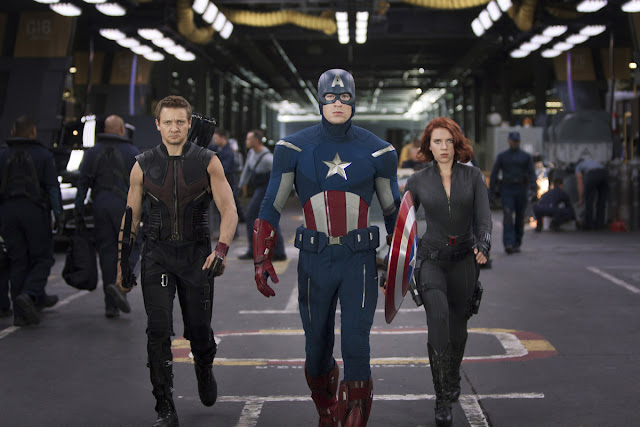 |
| (L-R): Hawkeye (Jeremy Renner), Captain America (Chris Evans), Black Widow (Scarlett Johansson) |
But my biggest problem? No women talked to each other. At all. What the hell is up with that??
Like
Film School Rejects’ Gwenn Reyes, I too found the glaring lack of women talking to each other to be
The Avengers “
greatest flaw.” Maria talks to the other Avengers. As Nick Fury’s right-hand person, it makes sense she would interact with the Avengers. Plus Maria and Natasha have probably crossed paths before since Black Widow already worked for S.H.I.E.L.D. Couldn’t the two women have talked about the upcoming battle? Or strategized, commiserated…anything??
Just because the portrayals of the female characters were positive, doesn’t mean I think the movie
smashed the Bechdel Test, a simple test that asks that two named female characters talk to each other about something other than men. With
women comprising only 33% of speaking roles on-screen,
The Avengers failing the Bechdel Test proves the cavernous gender gap in film and how far we still need to go.
Let me be clear. Most movies — superhero or otherwise — couldn’t care less about portraying complex, intelligent, strong, dimensional women or gender equitable roles. So The Avengersis a step in the right direction. But if you only depict your two female characters (no matter how empowered they are) talking to men, it subtly reinforces the notion that women’s lives revolve around men.
While it’s a really good action movie with strong female roles, I still expected more feminism from you, Joss Whedon.
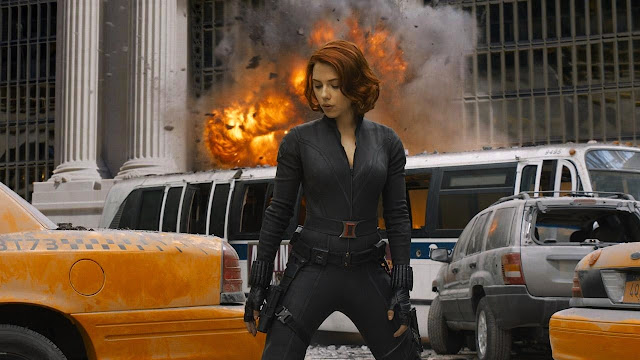





Psst! “Welcome to the Dollhouse” is a movie. Whedon’s series was just “Dollhouse”.
While there definitely is a lack of strong feminine roles in film, and even in the comics from which this movie originated, people should understand some things.
There’s a certain capitalization in revenue that is on the producers’ minds when brainstorming before shooting. Firstly, The Avengers, and so many other superhero movies are CLEARLY “macho” films, and if they’re aiming for that macho crowd they’re simply not going to include a lot of deep female characters. Strong? Yeah, but not too complex. Secondly there is an important matter of accuracy, as I’m sure less than 10% of superheros are female or colored. I can imagine people being in uproar because of any inaccuracies happening that might add more female/colored characters are even change known characters, as they did with Peter Parker in a recent variation of a Spider-man comic.
However I am not anti-feminist! Just sayin’. If you’re looking for an awesome, complex, deep, kick-ass female character, look out for Selina Kyle (Cat-Woman), in the upcoming Bat-Man film!
@Mokie, thank you!!! You know when you know a title, yet the completely wrong title lodges itself in your memory? Clearly, I should not be writing late at night!
@Manny, I agree that the producers view superhero movies as “macho,” even though a lot of women (myself included) love comic books and their film adaptations.
Regarding accuracy, the first Avengers comic included Ant-Man, Iron Man, Thor, Wasp, the Hulk and then Captain America a few issues later. So clearly Whedon and the producers were okay with making some changes. But why would it be inaccurate to have complex female roles and have two women talking to each other? It happens in comic books and in real life. So it should happen in film too.
As far as strong comic book female characters, I absolutely love Selina Kyle (AND Anne Hathaway…can’t wait for the Dark Knight Rises!!), Ororo Munroe (Storm), and Sara Pezzini (Witchblade).
There is always Avengers 2……
1) i’d love to see a black widow movie in the realm of jason bourne. will that ever happen?
2) i still like the movie, but yeah it is odd that the women didn’t chat with one another. but black widow was the only avenger and he avengers really spoek only to one another.
3) i though hiddleston was a lot more fascinating to watch that ruffalo.
I caught the “mewling quim” line when it came out, mostly because it came off as very vulgar to me before I realized a lot of people might not be as familiar with a somewhat obscure bit of British slang for vagina. But upon consideration I think it was a very intentional choice of insult and worked well in context. Loki’s misogyny was hinted at in Thor when he made a rather vitriolic rant about Jane that ended with a possible threat of sexual assault. He doesn’t like women, or at least he doesn’t like the emotions women seem to inspires in others, sympathy, compassion, loyalty, and love. Women, especially human women, are weak and create weakness in others. In light of that ideology, Fury’s supposed good-cop-bad-cop plan with Natasha as the sympathizer would be incredibly insulting and infuriating. The approach Natasha actually takes, putting her concern for Clint over everything else, cloaking her attempt to appeal to Loki’s sympathy in an emotionless “clear the ledger” bit, played right into Loki’s misogynistic (and a bit xenophobic because you can’t throw his general disdain with humanity out) assumptions. He sees her as weak for her attachment, he already associated emotional weakness with women, and he attacks her in a way that screams “how dare you think a Woman and her Feelings can ever get the best of me.” And he ultimately gives his hand away in the process because Natasha played him like cheap violin from the moment she walked into the door. I think that’s what really sold me on Natasha as a great example of a heroine. While it’s implied that the sexy spy will use her feminine whiles to get things, her best interrogation is predicated on her using that other stereotypical set of feminine traits, emotion and sympathy, and using the villain’s very resentment of them to trick him. The use of a sexist slur is vital to the scenario; baiting a misogynist with their own irrational bigotry means you have to out that hate.
Okay, laying out a couple of thoughts:
1) Yes, Black Widow is the only female Avenger. I’m not going to go out of my way to defend that, but the truth is that there haven’t been any other female superheroes introduced in previous Marvel films, as Black Widow was in Iron Man 2. Joss actually wrote an early script that tried to feature Janet Van Dyne (The Wasp), but he wasn’t able to make the dynamic work, and when you consider that he was juggling six superheroes, introducing and giving equal time to a brand new character – male or female – would have been foolhardy. With The Avengers’ success, more female characters like Wasp or Ms Marvel can be introduced in or by the next installment.
2) Not Feminist? Black Widow is a human assassin, with no superpowers to speak of. And yet she not only is placed on a pedestal equal to a genetically-enhanced supersoldier, a genius who created the world’s most advanced set of combat armor, a Norse God and the most powerful creature on Earth, but she holds her own when battling amongst them. She’s the perfect balance of brains and strength, and nobody in the film treats her as a sexual object (The same with Agent Maria Hill, by the way…). No, it doesn’t pass the Bechdel test, but that shouldn’t be your catch-all to immediately state that the film itself isn’t feminist.
3) The Avengers – not only the best movie this year, but far and away the most fem-friendly.
BTW, I agree with oldscrumby’s point. Yes, Loki uses a derogatory slur, but let’s face it: he really is not a nice guy. That may be an oversimplification of what is said above, but the fact that Natasha turns it back on Loki, ferrets out his plan and ultimately outsmarts him is priceless. That phrase is really only bad when you take it out completely out of the context of the scene.
Hi, Megan, sorry to have missed this piece earlier this month. Just read it and wanted to comment.
This is disappointing to say the least. While I haven’t seen The Avengers, and don’t plan to (I have an aversion to franchise comic book movies ever since “Wolverine”), I’m guessing what happened was serious studio interference and probably a studio-assigned script doctor, people who are never credited so you never know who they are — the Shadow People! I like Joss Whedon and the strong female characters he creates, though I mostly know him through “Firefly” and “Serenity,” but it’s never a guarantee that a talented and respected writer/director who helms a franchise flick actually gets to express who they really are. Sounds like that might’ve happened here. Franchise flicks, esp. based on comic books, I find are at best disappointing, and at worst, severely reductionist, esp. when it comes to women.
I can only hope to hell that it’s the studio’s fault that the huge job that Whedon did with this picture doesn’t actually match what he’s done in the past. Leave it to an exec to crap all over something…
“if you only depict your two female characters (no matter how empowered they are) talking to men, it subtly reinforces the notion that women’s lives revolve around men”
This.
However, cynic that I have become, I had written off Avengers before reading this review. Now I want to see it. So thanks for that, too!
Megan, thank you for all your thoughts! I think this article has some really good and sorely needed ideas, in this day and age. I disagree on a couple of points, but on the whole I think it’s really insightful about the situation. I’ve been of the opinion for some time that, although I do greatly admire his talent and commitment to feminism, Joss Whedon is sometimes given too much credit, as are many famous names in film-making. Any film involves the hard work and creativity of many people, but so often the mainstream media and consumers give the credit to one prominent member of the crew, namely a director or producer (saying any film is a So-and-so film ignores and/or belittles the contributions of the rest of the crew and cast). With Whedon, he is noted for his efforts to promote strong and complicated female character, but often when they fall short, people seem not to notice. I recently started watching Buffy, and was expecting from all that I’d heard that it would be an incredible show, but needless to say I soon found myself having second thoughts about how truly feminist it was. For instance, though Buffy is a slayer, she often just wants to be a “normal” girl, a role that carries many issues for feminist thought. Granted the show was aired some time ago.
I wanted to say that I take issue with your comment about Loki’s insult towards the Black Widow. I kinda feel that Loki feels he is above all human-kind, as is displayed on a number of occasions. How about the fight between him and Captain America, where Loki physically tries to make Capt. kneel down as a servile lowlife. I agree that one might interpret an element of hidden “cunt” to his words, but I think that’s largely due to interpretation. Looking at the words, “Mewling quim”, “mewling” makes me think of beggar, or whiner, which could be man or woman, though there is a history of gendering women as pitiful and small (small alla “quim”), but the literal insult does not directly highlight gender. Being small and insignificant could, and has, been used to demean men, and, again, it does not automatically imply sexism. That it is one interpretation. Part of this I think comes from the tendency (I totally do it too!) to judge men and women as different groups. Were Loki to insult a male, we wouldn’t start to analyze whether his comment(s) were gendered (sexist or biased against masculinity). But when women come into play, the question of whether something is sexist can sometimes become over-analyzed. I’m not trying to say that your attempts to root out sexism are in vain, I just think that there are often more factors that need to be addressed. I’d argue that Loki treats everyone with utter disdain, male or female.
And what about they rest of the guys? When Stark comes in with a bang in Stuttgart, he comments to Natasha, “Did you miss me?” as he commandeers her place on the P.A. system to blast his rock music. His comments, I’d argue, are much more sexist, putting her in the role of lover/love-interest with “Did you miss me?” and literally silencing her voice and brushing her aside in the fight. Don’t you think this is also sexist rhetoric? And Stark is supposed to be one of the film’s he roes, whereas Loki (although sympathetic) is the villain. In counting Loki’s comment as sexist, you are putting sexism on the side of the villain, which is a very apt place to put it. But Stark’s comments, and the not-problem-itized aspect of his character as a playboy (something I’d argue is ripe for discussion of sexism) is placed on the side of the heroes, and not really discusse further. Yes men can totally be flawed, but we never really talk about how this part of Stark’s character is sexist. He’s at this point going steady with Pepper, rather than using women for sex and then flinging them out the door the next day, but this is never focused on. The Iron Man movies focus on his faults, but those connected with his job as a weapons manufacturer. His fault as a womanizer is never put under the microscope. (granted Stark is not the sole focus of the Avengers for a reason, but this facet of his life is not once problem-itized even casually)
If we’re going to blame anyone for sexism in the Avengers, blame Marvel. Out of all the superheroic women they’ve created in the over 50 years their shared universe has existed, how many were established in movies before “The Avengers”? The women in X-Men or Electra don’t count, because they didn’t own the cinematic rights…
Ultimately, Whedon was ordered to craft a story about charismatic leading men working through their incredibly immature personal issues. And he failed to do more than that for the most ironic of reasons – when the only personality the women were allowed to show was “Strong, intelligent, asskickers”, there’s no way to get emotionally invested in their characters, except to find out whether Black Widow can hang with gods and monsters.
Thank the Goddess the answer was yes, but…
Name one character flaw for Tony Stark. Easy, right? He’s practically the devil. Hulk? It’s like dynamiting fish in a barrel. Captain America is boyishly naive’, Thor represents a much older code of honor, and there’s a good reason we’ve evolved beyond that. Hawkeye is the only one of these people who at all seems mortal. Nick Fury has his own agenda.
In any scene, they’re all bouncing off of each other.
Who is the Black Widow, when she’s not just doing her job? Why is it so hard to write women in action movies who are people too?
For comparison, look at the women in Firefly or Buffy – put any combination of them in a room together, and the dialogue would just write itself.
I think you have some great thoughts!! I would have to disagree on putting Buffy as a top tier feminist character. Though people will probably be aghast at me, I do not think she (the show in general) is as strong as reputation promotes. I think that Buffy has a lot that was sorely needed at the time, but was far from complete. Buffy on the surface seems to hold some strong indicators of femininism, but there is a strong underlying structrue of partriarchy. For one, buffy wants to live a normal life, and this normal life manifests in wanting to be a part of being swept away by boys, for one. She is the slayer, and it is implied by the use of “she” in the introduction that only women are chosen as slayers. This, on the one hand, is positive, since it suggests that “he”s would not be to the arderous task. But it does not place men and women as equals. Matriarchy is not good either, as both men and women would suffer as they do under patriarchy. And, having “she” be chosen as the slaying in a group of only females invites the challenge that if there were boys considered, girls would not stand a chance, that they are chosen because boys are not considered.
That said, I do appreciate Buffy’s strength, and contribution to creating a feminist voice in mainstream! We need more!